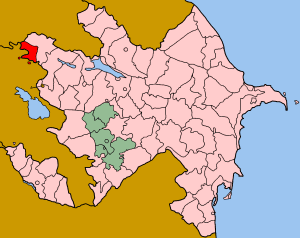| Revision as of 01:20, 6 February 2007 editAlpertunga5000 (talk | contribs)1,808 editsNo edit summary← Previous edit | Revision as of 01:22, 6 February 2007 edit undoAivazovsky (talk | contribs)25,346 edits Partial rv - please discuss your edits.Next edit → | ||
| Line 4: | Line 4: | ||
| ==History== | ==History== | ||
| Under the ], the rayon was part of the Kazakh uyezd of the Elisavetpol |
Under the ], the rayon was part of the Kazakh uyezd of the Elisavetpol guberniya. With the fall of the Russian Empire, dispute over the region arose between the Armenians (who made up 39% of the population) and the Azerbaijanis (who comprised 57%).<ref name="Brockhaus">{{ru icon}} St. Petersburg, Russia, 1890-1907</ref> When the South Caucasus came under British occupation, ], British Chief Commissioner in the South Caucasus, decided that assigning the Erivan and Kars guberniyas to ] (DRA) and the Elisavetpol and Baku guberniyas to the ] (ADR) would solve the region's outstanding disputes. However, this proposal was rejected by both Armenians (who did not wish to give up their claims to Kazakh, Zangezur (today ]), and ]) and Azerbaijanis (who found it unacceptable to give up their claims to ]). As conflict broke out between the two groups, the British left the region in mid-1919. <ref name="Atlas">Dr. Andrew Andersen, Ph.D. </ref> By 1920, the area of the former uyezd came under full administration of the DRA.<ref name="AndersenQazakh">Andersen. </ref> It remained under Armenian authority both during the Bolshevik invasion of the South Caucasus and within the ] (est. 1922). <ref name="AndersenQazakh" /> After Sovietization, however, the borders of the Transcaucasian republics were redrawn several times. Between 1923 and 1928, the northern half of the former uyezd was ceded to Azerbaijan while the southern half, roughly corresponding to the present-day ] province in Armenia was retained. Armenia's territorial losses, however, were compensated with the assignment of ] from Georgia to Armenia. <ref name="AndersenQazakh" /> | ||
| It should be noted that the former Kazakh uyezd was divided between Armenia and Azerbaijan mostly along ethnic lines. Armenia would get the territory roughly corresponding to its modern-day province of ], which held a substantial Armenian population, while Azerbaijan would retain the predominately Azeri territories, including the town of Qazakh itself. Additionally, Armenia got the assignment of the adjacent ] from Georgia to Armenia. <ref name="Atlas">Dr. Andrew Andersen, Ph.D. </ref> | |||
| ==Footnotes== | ==Footnotes== | ||
| {{Reflist}} | {{Reflist}} | ||
Revision as of 01:22, 6 February 2007

Qazakh (Azerbaijani: Qazax, Armenian: Քազաք; also known as Kazakh or Gazakh) is a rayon of Azerbaijan. It has two exclaves, Yukhari Askipara and Barkhudarli inside Armenia and have been under Armenian control since the Nagorno-Karabakh War.
History
Under the Russian Empire, the rayon was part of the Kazakh uyezd of the Elisavetpol guberniya. With the fall of the Russian Empire, dispute over the region arose between the Armenians (who made up 39% of the population) and the Azerbaijanis (who comprised 57%). When the South Caucasus came under British occupation, Sir John Oliver Wardrop, British Chief Commissioner in the South Caucasus, decided that assigning the Erivan and Kars guberniyas to Democratic Republic of Armenia (DRA) and the Elisavetpol and Baku guberniyas to the Azerbaijan Democratic Republic (ADR) would solve the region's outstanding disputes. However, this proposal was rejected by both Armenians (who did not wish to give up their claims to Kazakh, Zangezur (today Syunik), and Nagorno-Karabakh) and Azerbaijanis (who found it unacceptable to give up their claims to Nakhichevan). As conflict broke out between the two groups, the British left the region in mid-1919. By 1920, the area of the former uyezd came under full administration of the DRA. It remained under Armenian authority both during the Bolshevik invasion of the South Caucasus and within the Transcaucasian SFSR (est. 1922). After Sovietization, however, the borders of the Transcaucasian republics were redrawn several times. Between 1923 and 1928, the northern half of the former uyezd was ceded to Azerbaijan while the southern half, roughly corresponding to the present-day Tavush province in Armenia was retained. Armenia's territorial losses, however, were compensated with the assignment of Lori from Georgia to Armenia.
Footnotes
- Template:Ru icon Brockhaus and Efron Encyclopedic Dictionary. "Kazakh". St. Petersburg, Russia, 1890-1907
- Dr. Andrew Andersen, Ph.D. Atlas of Conflicts: Armenia: Nation Building and Territorial Disputes: 1918-1920
- ^ Andersen. Atlas of Conflicts: Armenia and Karabakh: Territorial Disputes of 1921-22 And Future Territorial Adjustments Between 1923 and 1928
This Azerbaijan location article is a stub. You can help Misplaced Pages by expanding it. |